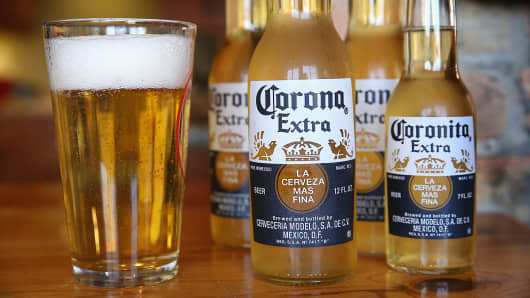Pilsners, pale ales, brown beers, dark lagers and stouts:
there's so many different types of beer to choose from to help you
socialize with friends, watch that boring ball game or simply drown your
sorrows. But despite a craft "revolution" - especially in the U.S. -
the long-term trends for beer don't look great, with market share being
squeezed by rivals like spirits and soft drinks.
A round of research notes this month did little to lighten the mood on the big businesses behind the brewing of beer, with Renaissance Capital highlighting that beer growth rates have slowed in the past decade.
"Changes in the global workforce and narrowing income gaps, favoring women, plus millennials' preferences for non-beer products have contributed to beer's
softer trends, in our view," said Rey Wium, a beverage analyst at the investment banking firm, in a note on Wednesday.
Beer volume growth over the past five years has been 2.1 percent, according to Wium, who credited data from research specialists Canadean. This was down from 2.8 percent a year over the past 10 years.
Statistics from Euromonitor reveal a similar trend. When adding together volumes sold for beer, spirits, and soft drinks, the former had a 24 percent share in 2009, according to the research firm. The global population is set to consume more of each by 2018, but the share of beer that is drunk would have crept down to 21 percent, according to its data.
Read MoreCraft beer drinkers can't get enough IPA
A round of research notes this month did little to lighten the mood on the big businesses behind the brewing of beer, with Renaissance Capital highlighting that beer growth rates have slowed in the past decade.
"Changes in the global workforce and narrowing income gaps, favoring women, plus millennials' preferences for non-beer products have contributed to beer's
softer trends, in our view," said Rey Wium, a beverage analyst at the investment banking firm, in a note on Wednesday.
Beer volume growth over the past five years has been 2.1 percent, according to Wium, who credited data from research specialists Canadean. This was down from 2.8 percent a year over the past 10 years.
Statistics from Euromonitor reveal a similar trend. When adding together volumes sold for beer, spirits, and soft drinks, the former had a 24 percent share in 2009, according to the research firm. The global population is set to consume more of each by 2018, but the share of beer that is drunk would have crept down to 21 percent, according to its data.
Read MoreCraft beer drinkers can't get enough IPA
A population surge means that Africa is set to overtake China as the major growth area for the industry too, with Deutsche Bank stating earlier this month that Heineken and SABMiller appear to be best positioned to capture this growth.
"Over the next decade, Africa should account for 40 percent of global volume and profit growth," Wynand Van Zyl, a research analyst at the German bank, said in a note on February 4.
Meanwhile, Goldman Sachs is feeling bullish on Constellation Brands, which produces Mexican brands like Corona and Modelo Especial. The bank upgraded the outlook on its stock to a "buy" from a "neutral" last month due to "accelerating U.S. growth" and "exposure to an attractive core Hispanic demographic."
Read MoreHardcider growing fast in US: Pro
Indeed, a survey by Renaissance Capital this week showed that Latin America was the only region where the market share of beer was growing, despite being more expensive than spirits on a liter-of-pure-alcohol basis. In the U.S. and Europe beer is cheaper than spirits but its market share is still in decline, according to Wium.
It's also less flexible on the innovation front, according to the analyst, providing yet more challenges to the world's most widely consumed alcoholic beverage.
"Beer companies need to invest more in innovation just to maintain its customer group," he said.
"This implies higher costs while innovation tends to lead to smaller incremental revenue benefits, hence margins are not automatically guaranteed. We believe the cost-saving plans announced across the beer industry are probably more a function of necessity."
Read MoreThe obscure Brazilian booze Snoop Dogg just loves


No comments:
Post a Comment